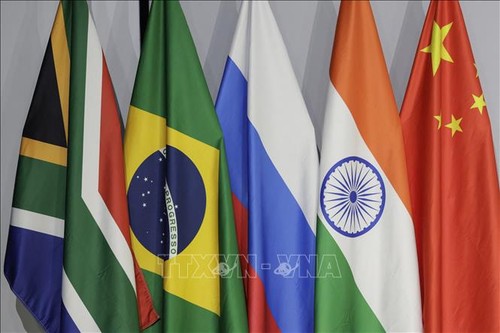BRICS Nations Forge Ahead with Independent Financial System
In a significant move towards financial autonomy, the BRICS economic bloc is laying the groundwork for a financial system free from third-party dominance. This initiative, spearheaded by the BRICS nations (Brazil, Russia, India, China, South Africa, Ethiopia, Iran, and Egypt), aims to create a robust framework for transactions using national currencies, thereby reducing reliance on the US dollar.
During the 12th World Peace Forum held in Beijing recently, Russian Ambassador to China, Igor Morgulov, emphasized the strategic significance of this development. Highlighting the increasing volume of transactions in national currencies among BRICS countries, Morgulov underscored the group’s commitment to exit the dollar-dominated financial sphere.
A central component of this strategy is the creation of mechanisms and tools that enable a truly independent financial system. While the introduction of a single BRICS currency remains a long-term goal, current efforts are focused on reinforcing the financial independence of member nations. Morgulov’s remarks follow previous statements by Russia’s Deputy Finance Minister, Ivan Chebeskov, who revealed last month that Russia, in collaboration with other BRICS central banks, is advancing the development of a settlement-and-payment infrastructure. This includes the launch of the BRICS Bridge platform, designed to facilitate settlements in national currencies.
The Geopolitical Significance
This drive towards financial independence comes at a time of shifting global economic power. The BRICS bloc, representing some of the world’s fastest-growing economies, has been increasingly vocal about the need for a multipolar world order. These countries argue that the current financial system, heavily dominated by Western powers, does not adequately reflect the growing economic influence of developing nations.
For Russia, especially, this initiative is part of a broader strategy to mitigate the impact of international sanctions that have targeted its economy. By promoting transactions in national currencies and reducing dependency on the US dollar, BRICS nations aim to shield their economies from geopolitical volatility and exert greater control over their financial destinies.
A Step Toward Economic Sovereignty
The broader vision behind this financial independence extends beyond mere economic transactions. It represents a collective stride towards political and economic sovereignty. The BRICS nations, with their diverse and massive populations, have the potential to redefine global trade dynamics by leveraging their combined economic strengths.
The BRICS Bridge platform, once operational, is poised to streamline and standardize financial transactions within the bloc, fostering closer economic ties and facilitating smoother business operations. This platform is expected to be a cornerstone in the drive towards financial independence, embodying the spirit of cooperation and mutual benefit that defines the BRICS alliance.
Looking Ahead
As BRICS nations continue to expand their economic collaboration, the global financial landscape is likely to witness significant shifts. The move towards an independent financial system, while ambitious, is part of a broader realignment where emerging economies seek a greater voice and more significant role in global governance.
While challenges remain, especially in creating a unified currency, the steady progress in increasing national currency transactions within the bloc is a promising step forward. As these initiatives gain traction, they could serve as a blueprint for other regional alliances seeking to enhance economic self-reliance and reduce dependency on established financial powers.
